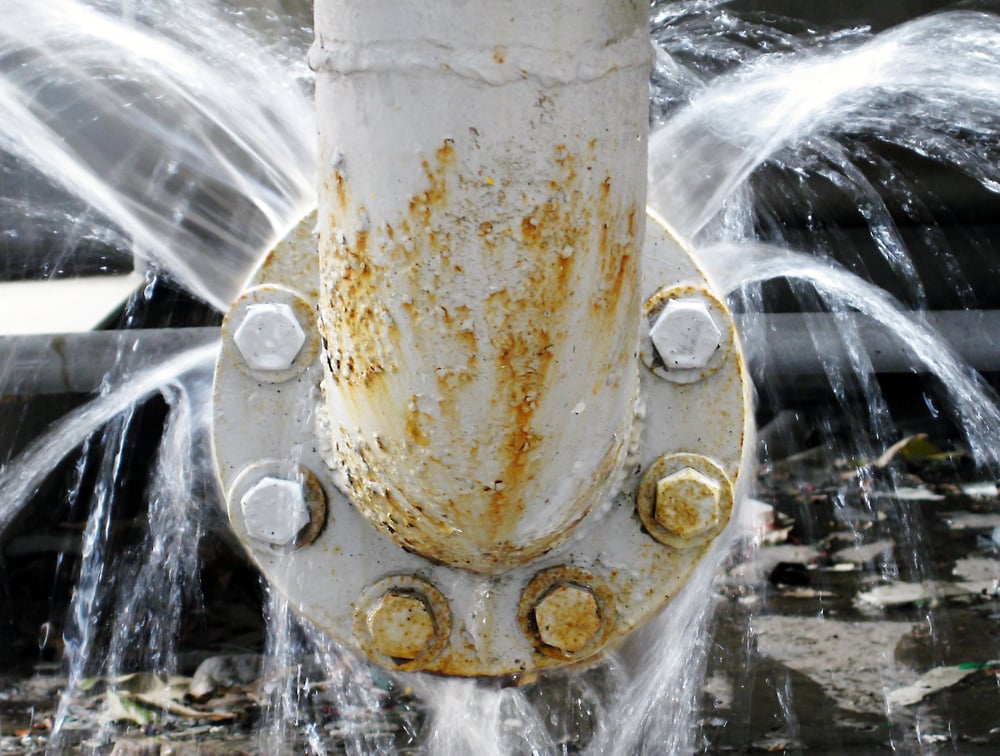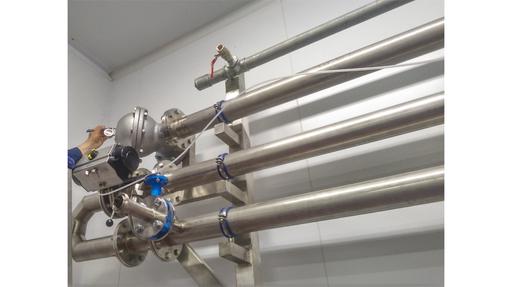Hammering in water pipes is caused by sudden changes in water pressure. This can occur due to quick valve closures.
Water hammer, also known as hydraulic shock, is a common plumbing issue. It happens when water flow is abruptly stopped or redirected. This sudden change in pressure creates a shockwave, resulting in loud banging noises. High water pressure, faulty valves, or loose pipes can exacerbate the problem.
Homeowners often find the noise alarming and disruptive. Ignoring water hammer can lead to pipe damage and leaks. Simple solutions like installing water hammer arrestors or securing loose pipes can mitigate the issue. Proper maintenance and timely repairs ensure a quieter and safer plumbing system.
Introduction To Water Hammer
Water hammer is a common issue in homes. It causes loud noises in pipes. This can be alarming and annoying. Understanding water hammer helps in fixing the problem. Let’s explore what water hammer is and its symptoms.
Definition Of Water Hammer
Water hammer occurs when water flow stops suddenly. This creates a shockwave in the pipes. The shockwave causes a loud banging noise. Water hammer is also known as hydraulic shock. It often happens when valves close quickly.
Common Symptoms
- Loud banging or thumping noises in pipes
- Pipes vibrating or shaking
- Loose or damaged pipe fittings
- Water pressure fluctuations
| Symptom | Description |
|---|---|
| Banging Noises | Loud noises from pipes when water flow stops |
| Pipes Vibrating | Pipes shake or move due to shockwave |
| Loose Fittings | Pipe joints become loose or damaged |
| Pressure Fluctuations | Water pressure changes suddenly |
Primary Causes Of Water Hammer
Water hammer, often called hydraulic shock, can be a real nuisance. Understanding its primary causes helps prevent damage to your plumbing system. Let’s explore the main reasons behind this issue.
High Water Pressure
High water pressure is a major cause of water hammer. Water moves quickly through pipes under high pressure. When it suddenly stops, it creates a loud banging noise. This noise is the water hammer effect.
High water pressure can damage pipes and fixtures. It puts extra strain on the plumbing system. Installing a pressure regulator can help manage this problem.
Signs of high water pressure include:
- Loud banging noises
- Leaks in pipes
- Frequent faucet leaks
Quickly Closing Valves
Quickly closing valves can also cause water hammer. When a valve shuts too fast, it stops the water flow suddenly. This sudden stop creates a pressure wave, leading to a banging noise.
Common valves that cause this issue include:
- Washing machine valves
- Dishwasher valves
- Toilet fill valves
To prevent water hammer, use slow-closing valves. These valves reduce the chances of sudden water stops.
Here is a simple table comparing regular valves and slow-closing valves:
| Valve Type | Water Hammer Risk |
|---|---|
| Regular Valves | High |
| Slow-Closing Valves | Low |
Switching to slow-closing valves can greatly reduce water hammer in your home.
Identifying The Issue
Identifying the issue of hammering in water pipes can save you from costly repairs. Hammering sounds in your pipes might indicate a serious problem. Let’s explore how to spot the issue.
Auditory Clues
Listening for unusual sounds is the first step. Hammering often sounds like banging or knocking. These noises occur when you turn off a faucet or valve. You might hear these sounds more at night. Pay attention to the time and source of the noise. Consistent patterns can help identify the problem.
Visual Inspections
After listening, check your pipes for visible issues. Look for loose pipes that might be shaking. Inspect the pipe brackets and supports. Loose brackets can cause pipes to move and make noise. Also, check for water leaks or damp spots. Leaks can weaken the pipe structure, causing hammering sounds.
| Inspection Point | What to Look For |
|---|---|
| Pipe Movement | Check if pipes are shaking or moving. |
| Brackets and Supports | Ensure brackets are secure and not loose. |
| Water Leaks | Look for damp spots or leaks around pipes. |
By following these steps, you can identify the hammering issue. Addressing the problem early can prevent further damage. Keep your home’s plumbing in good shape.

Credit: www.mrrooter.com
Impact On Plumbing Systems
The hammering in water pipes, also known as water hammer, can significantly disrupt plumbing systems. This phenomenon usually occurs due to the sudden stoppage of water flow, causing a shockwave. Understanding its impact is vital for maintaining a healthy plumbing system.
Potential Damage
Water hammer can lead to a variety of damages in your plumbing system. The most common issues include:
- Pipe Damage: The repeated shockwaves can weaken or crack pipes.
- Joint Leaks: Water hammer can cause joints to loosen, leading to leaks.
- Fitting Damage: Fittings and seals may break due to constant vibrations.
These damages can result in costly repairs if not addressed promptly.
Long-term Effects
The long-term effects of water hammer on plumbing systems are concerning. Here are some key impacts:
- Reduced Lifespan: Continuous stress reduces the lifespan of pipes and fixtures.
- Increased Repair Costs: Frequent repairs become necessary, leading to higher costs.
- Water Waste: Leaks and bursts lead to significant water wastage.
Addressing water hammer early helps prevent these long-term issues.
Diy Solutions
Water hammering is a common issue in many households. It causes loud noises in pipes. Luckily, there are simple DIY solutions to fix this problem. Let’s explore them.
Installing Water Hammer Arrestors
A water hammer arrestor absorbs shock waves in pipes. This prevents the hammering sound. Follow these steps to install one:
- Turn off the main water supply.
- Locate the noisy pipe section.
- Cut the pipe using a pipe cutter.
- Install the water hammer arrestor.
- Secure it with pipe clamps.
- Turn the water supply back on.
Tip: Use Teflon tape to seal the threads. This prevents leaks.
Adjusting Water Pressure
High water pressure can cause hammering. Adjusting it can help. Follow these steps:
- Find the water pressure regulator. It is near the main water supply.
- Turn the adjustment screw counterclockwise.
- Check the pressure with a gauge. Aim for 50-60 psi.
- Test the water flow and listen for hammering.
Note: If unsure, consult the manual of your pressure regulator.
Professional Fixes
Hammering in water pipes, also known as water hammer, can be a bothersome issue. Professional fixes can help solve this problem. Below are some expert techniques and solutions.
Pipe Securing Techniques
Loose pipes can cause water hammer. Securing pipes can reduce noise and vibration. Professionals use pipe straps to hold pipes in place. They add cushioning materials like foam or rubber. This absorbs shock and reduces hammering sounds.
Another method is using pipe clamps. These are adjustable and provide a firm grip. They prevent the pipes from moving when water flows. Brackets are also used to secure pipes to walls or floors. This keeps them steady and reduces noise.
Advanced Pressure Regulation
High water pressure can cause water hammer. Professionals install pressure regulators to control water flow. These devices reduce pressure and prevent sudden surges. A pressure reducing valve (PRV) is a common tool used. It maintains a steady flow and reduces the risk of hammering.
Sometimes, adding an air chamber can help. This device absorbs the shock of water flow. It acts like a cushion and reduces noise. Another option is installing water hammer arrestors. These are specialized devices that control pressure and prevent hammering.
Here is a table summarizing the professional fixes:
| Technique | Description |
|---|---|
| Pipe Straps | Hold pipes in place with cushioning materials. |
| Pipe Clamps | Adjustable grips to prevent pipe movement. |
| Brackets | Secure pipes to walls or floors. |
| Pressure Regulators | Control water pressure to reduce surges. |
| Pressure Reducing Valve (PRV) | Maintain a steady water flow. |
| Air Chamber | Absorb shock to reduce noise. |
| Water Hammer Arrestors | Specialized devices to control pressure. |
Preventative Measures
Water hammering in pipes can be annoying and damaging. Taking preventative measures helps avoid these issues. Here, we’ll discuss effective ways to prevent water hammering.
Regular Maintenance
Regular maintenance is essential to keep your plumbing system in good shape. Follow these steps to ensure your pipes are free from issues:
- Inspect Pipes: Check for leaks, corrosion, and other damage.
- Drain and Flush: Periodically drain and flush your water heater. This removes sediment buildup, which can cause hammering.
- Secure Pipes: Ensure pipes are properly secured with clamps. Loose pipes can cause vibrations and noise.
Upgrading Plumbing Fixtures
Upgrading plumbing fixtures can help reduce water hammering. Consider these upgrades:
- Install Water Hammer Arrestors: These devices absorb shock and prevent noise.
- Replace Old Valves: Old valves can wear out and cause water hammering. Install new, high-quality valves to reduce issues.
- Use Pressure Regulators: High water pressure can cause hammering. Installing a pressure regulator keeps pressure at a safe level.
Taking these preventative measures can help keep your plumbing system quiet and efficient. Regular maintenance and upgrading fixtures are key steps to avoid water hammering.

Credit: www.dft-valves.com
Conclusion And Final Thoughts
Water hammering can be a real nuisance. It can cause damage if not addressed. Understanding the causes helps in finding effective solutions.
Summary Of Key Points
Water hammering happens due to sudden water pressure changes. It can be noisy and harmful to pipes. The main causes include:
- High water pressure
- Quickly closing valves
- Loose pipes
- Air chambers filled with water
Long-term Benefits
Fixing water hammering has long-term benefits. It protects your plumbing system. Reduced noise means a quieter home environment. Proper maintenance also saves money on repairs. Here’s a quick look at the benefits:
| Benefit | Description |
|---|---|
| Reduced Noise | Quieter operation of water systems. |
| Pipe Protection | Prevents damage to pipes and fittings. |
| Cost Savings | Less need for expensive repairs. |
| System Efficiency | Improves overall plumbing efficiency. |

Credit: www.measuremonitorcontrol.com
Frequently Asked Questions
What Is Water Hammer In Pipes?
Water hammer is a banging noise in pipes caused by sudden pressure changes.
Why Do Water Pipes Hammer?
Water pipes hammer due to abrupt valve closures, causing pressure surges.
Can Water Hammer Damage Pipes?
Yes, water hammer can damage pipes and fixtures, leading to leaks.
How To Fix Water Hammer In Pipes?
Install water hammer arrestors or check for loose pipes to fix the issue.
Are There Preventive Measures For Water Hammer?
Yes, installing air chambers and maintaining proper pipe pressure can prevent water hammer.
Conclusion
Understanding the causes of hammering in water pipes is essential for maintaining a quiet home. Addressing issues like high water pressure, loose pipes, and faulty valves can prevent future problems. Regular maintenance and prompt repairs ensure a smooth-running plumbing system, saving you from costly fixes and noisy disturbances.
Keep your pipes in top condition for peace and comfort.
